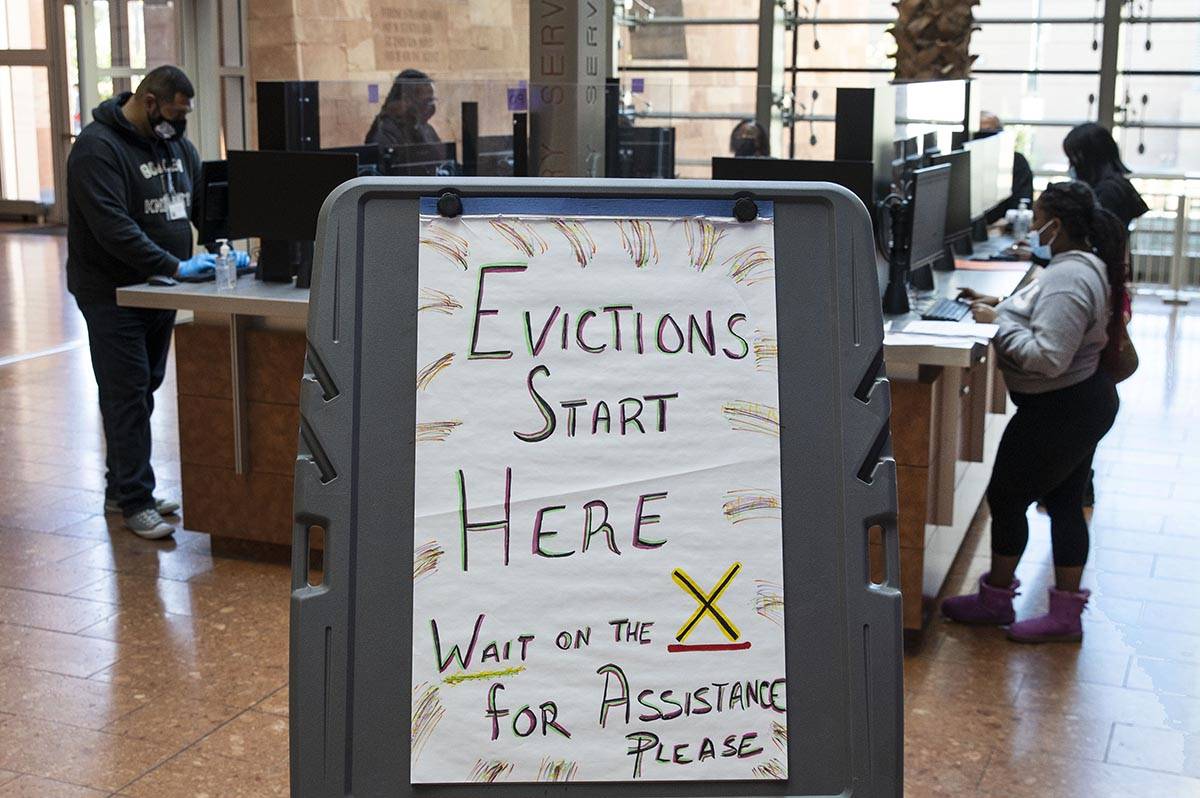Local advocates for tenants praise eviction ban extension
Thousands of struggling Southern Nevada renters got a 11th hour reprieve Monday when the federal government announced it was extending its eviction ban through June.
The Centers for Disease Control and Prevention announced the extension Monday, two days before federal protections were set to expire. It is the third time that the deadline has been pushed back.
Local anti-homeless groups and tenant advocates applauded the move Monday, but a representative for a Nevada apartment association called the move “devastating” for struggling landlords.
“I’m sure there’s a collective sigh of relief out there,” said Stacey Lockhart, executive director of HopeLink of Southern Nevada, a nonprofit that aims to prevent Las Vegas Valley residents from becoming homeless.
“Things in Las Vegas are looking up with tourism and jobs coming back,” she said. “And if we can provide that little bit of breather time, let people get a handful of paychecks under their belt, it would be helpful for both tenants and landlords.”
Taylor Altman, a staff attorney who works in the Consumer Rights Project at the Legal Aid Center of Southern Nevada, agrees. She said the CDC’s order comes at a critical time when the local economy is seeing signs of recovery.
“This extension is really important for Nevada, as we’re turning a corner in the pandemic, the economy is starting to rebound, people are getting vaccinated and going back to work,” said Altman. “And it also will allow time for millions of dollars in rental assistance to get into the hands of the landlord.”
The impact of evictions, without the CDC and/or state protections, would be devastating, advocates say.
The Center for Eviction Defense Project, in partnership with the Aspen Institute, projected last August that by the end of 2020, between 182,000 to 218,000 Nevada households — or 419,000 to 501,000 residents — were at risk of eviction. The percentage of households at risk of evictions, according to the U.S. projections, were the highest in Alabama and Nevada – both at 37 percent.
Wait-and-see for Nevada
Meanwhile, it remains unclear whether Gov. Steve Sisolak will extend Nevada’s eviction moratorium, which is slated to expire Wednesday. In December, Sisolak reinstated the eviction ban.
“The CDC extension announced this morning is currently being evaluated to determine Nevada’s next steps,” Sisolak spokeswoman Meghin Delaney said in a statement Monday to the Review-Journal. “As more information is available, we will share it with the press and the public as soon as possible.”
Taylor Altman, of the Legal Aid Center of Southern Nevada, said the CDC’s extension is a “really good” move, and that the organization is urging Sisolak to extend the state’s moratorium.
Protections under the CDC’s order are broad, Altman said, and is designed to apply broadly in every jurisdiction, requiring landlords to not evict covered persons from a residential property throughout the duration of the moratorium. Covered persons must meet certain criteria and must present the declaration to their landlord.
Altman describes the CDC’s order as “just a floor, not a ceiling,” and allows states to enact broader protections for their residents.
Sisolak’s eviction order, Directive 36, is “more protective” than the CDC’s order, Altman said.
The governor’s eviction moratorium is about how the CDC’s order applies in the state, and enacts specific protections in Nevada, said Altman. These include nonpayment of rent evictions, no-cause evictions, and possession of the property after the term if a tenant is behind on rent.
“The governor rightly issued Directive 36 to make clear how the CDC order would apply here in Nevada under our laws, and it’s really important to have that clarity and guidance for not only for the tenants, but for the courts and landlords as well,” said Altman.
The CDC’s order would still be impactful on its own, as it does provide some protection from eviction, Altman said, though having the state’s moratorium in effect concurrently would certainly provide more relief for Nevada tenants who provide the declaration to landlords.
“We really appreciate Governor Sisolak’s leadership on this issue during this difficult time for Nevadans. We’re hopeful that he will extend the state eviction protections concurrently through June 30 with the CDC extension,” she added.
‘Devastating’ for landlords
The CDC’s extension didn’t come as a surprise for the Nevada State Apartment Association.
“Given the state of recovery, it was not a surprise,” said Susy Vasquez, executive director of the group, which represents more than 140,000 rental units and is one of the largest trade groups in Nevada.
Her organization has told Sisolak’s office about how apartment complexes and small landlords have fared throughout the pandemic. “We wait to see how he will address the end of our moratorium set to expire on the 31st,” she said.
For struggling Nevada landlords, Vasquez said the CDC extension is “devastating.” The CDC’s eviction extension will come at a time when landlords will start seeing their utility bills go up.
“We also need to consider the upcoming heat of summer and whether or not landlords will have the ability to maintain operations as they head into the most expensive months of the year in little to no savings set aside,” Vasquez added.
Lockhart, of HopeLink of Southern Nevada, said she understands the plight for many landlords and apartment complexes, adding that the overwhelming majority of them are working with tenants to prevent evictions.
“I do have sympathy and compassion for landlords who are out there, because I know how hard it’s been on some of them: It’s not an easy place for anyone to be in right now,” she said. “I don’t want to see people evicted and out on the street, but at the same time, I want to see the landlords get paid too, so if everybody can just hang in there a little bit longer, I think we can accomplish both.”
Resources for Nevada tenants
Lockhart and Altman said tenants should immediately apply for Clark County’s CARES Housing Assistance Program — which provides rental assistance.
The program has helped more than 22,500 households with rent or mortgage bills and the county is expecting about $129 million in additional funding. For more information about CHAP and how to apply for the assistance, readers can visit chap.clarkcountynv.gov.
Altman said if tenants receive an eviction notice, tenants should immediately file an answer with the court. The Legal Aid Center of Southern Nevada, she said, is available to help tenants do that online.
Tenants should also review the state’s eviction moratorium.
“If you qualify, sign the declaration under the penalty of perjury, provide it to your landlord,” said Altman. “And then, when you get an eviction notice, file your answer and file a copy of that signed declaration, with a proof of service showing how it was delivered to your landlord.”
“Make sure to stay informed and stay proactive,” Altman added.
Readers who would like assistance from the Legal Aid Center of Southern Nevada can visit lacsn.org/covid-19, or call 702-386-1070 during business hours.
Contact Jonathan Ng at jng@reviewjournal.com. Follow @ByJonathanNg on Twitter.










































